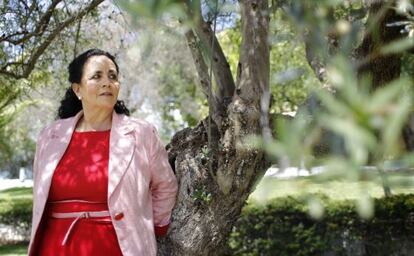Money moves downstairs: Daughter of master and servant wins right to fortune
Seville judge rules Sofía Reguera is the offspring of landowner who left 15 million euros to only recognized child

Sofía Reguera, 63, has three children and owns a small clothing store in the town of El Coronil, Seville province. But a judge has just opened the door to a new world of wealth for her: one half of a 15-million-euro inheritance left by a landowner who, according to the Seville court's decision, is Reguera's father.
"I didn't do it for the money, but to be recognized as who I am," she says. "But if my children have the right to be able to enjoy this inheritance, nobody should deny it to them."
Reguera's mother was practically still a child when she went to work as a servant at the home of some landowners. It was there that she began a relationship with the only son of the masters of the house. The affair was overlooked until she became pregnant. "His parents told her to go to the town to give birth and that when they returned they would get married," Reguera explains.
But when her mother left the property, the family arranged for the son to marry a young woman of his own social status.
Reguera always knew that the smart-looking man who came to see her in town once in a while when she was a girl was her father. Over time, the man had a child with the wife his parents had chosen for him, Reguera's mother remade her life with another man, and the visits became less and less frequent. But the photos taken at those meetings served to prove the relationship existed.
The DNA test showed a 99-percent probability that they were siblings
The judge also recognized that Reguera was named after her paternal grandmother, the mother of the man whom the court ruled was her father. "This circumstance cannot go unnoticed bearing in mind that the name Sofía is not very common in Seville, and even less so at the time at which the birth of the plaintiff took place," the judge said.
The landowner died of a brain tumor in 1970, at the age of 47, leaving only one recognized heir. "In those days family pressure was very strong. He knew that I was his daughter, but they didn't let him recognize me legally," says Reguera.
Decisive in certifying paternity was a DNA test from the recognized heir, who had had the remains of his parents and grandparents cremated in 2008, barely three months after Reguera had decided to take her case to the courts.
The timing did not go unnoticed by the judge, who noted in the sentence that the cremations had been done in "bad faith" in order to "hinder the investigation." The DNA test showed that the probability of the two of them being siblings was 99 percent.
Reguera says her mother had never wanted to take the issue to court: "She feared they would say she had allowed herself to get pregnant for the money. But they loved each other; it was a very nice relationship."
After the death of her mother, Reguera's children encouraged her to reclaim what she considered hers. Now she has won the first battle - proving who her father was. When the sentence is definitive, she will begin the second: to reclaim the inheritance. The man died leaving assets valued at 15 million euros, and without having made a will. Her lawyer, Fernando Osuna, expects the civil code to be applied and estimates that half of the assets would thus belong to Reguera. She hopes the fortune will serve to help her three children, one of whom has been unemployed for over three years.
For now Reguera does not want to give the name of her father, nor say to what family he belonged: "Out of respect, I prefer not to."
But she will do so when she definitively wins her battle in the courts and adopts the surname of the landowner. "At the moment I am Sofía Reguera Hidalgo," she says. "For now."
Tu suscripción se está usando en otro dispositivo
¿Quieres añadir otro usuario a tu suscripción?
Si continúas leyendo en este dispositivo, no se podrá leer en el otro.
FlechaTu suscripción se está usando en otro dispositivo y solo puedes acceder a EL PAÍS desde un dispositivo a la vez.
Si quieres compartir tu cuenta, cambia tu suscripción a la modalidad Premium, así podrás añadir otro usuario. Cada uno accederá con su propia cuenta de email, lo que os permitirá personalizar vuestra experiencia en EL PAÍS.
¿Tienes una suscripción de empresa? Accede aquí para contratar más cuentas.
En el caso de no saber quién está usando tu cuenta, te recomendamos cambiar tu contraseña aquí.
Si decides continuar compartiendo tu cuenta, este mensaje se mostrará en tu dispositivo y en el de la otra persona que está usando tu cuenta de forma indefinida, afectando a tu experiencia de lectura. Puedes consultar aquí los términos y condiciones de la suscripción digital.









































